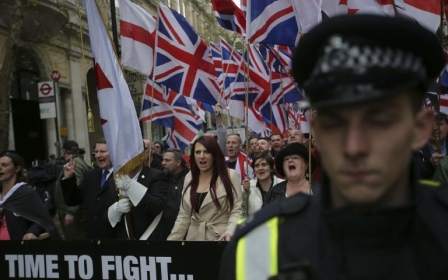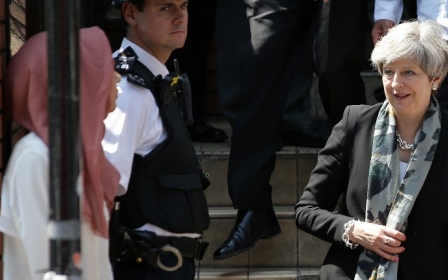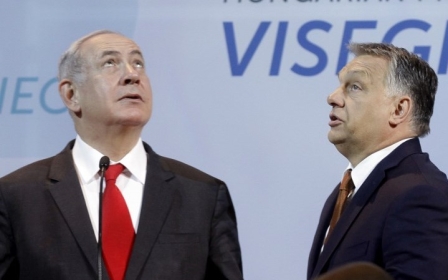Isolation, not integration for minorities targeted by Danish 'ghetto' policy
They were not happy with him, Danish immigration authorities told Odai al-Zoubi, when he met with them for what turned out to be the last time, earlier this year.
The latest of their problems was that he was a writer. It was not a real job, they implied, and he needed to get one if he wanted to stay in the country.
To settle in Denmark with his Danish wife, Zoubi had already had to pay down a large sum, learn the Danish language and meet a host of requirements regarding how and where he lived.
But the goalposts for residency kept moving and, as a Syrian, he never felt welcomed in Denmark anyway, let alone after the country recently introduced a series of new laws focused on ethnic minorities. So he gave up and moved to Sweden.
"You don't know your rights, and you don't know your duties," Zoubi said, comparing the whims of the immigration services to the uncertainties of living under the authoritarian government he had escaped from. "At any time, the government can make a decision on your future."
When they talk about Muslims, it's something scary
- Odai al-Zoubi, Syrian writer
Zoubi's two and a half years in Denmark were brief and uncertain. His feelings are increasingly shared by other minorities, whether refugees, migrants or their descendants born in the country, as anti-immigrant sentiment becomes more strident and marches into mainstream politics.
"When I told people I was moving to Sweden, they would hug me and say they wished they could do it as well," he said.
Denmark’s "ghettos," the name given to low-income areas that host much of the country's minority population, have become the focus of harsh new laws that apply exclusively to disadvantaged residents of the areas.
Under the new legislation, children are obliged to attend day-care centres to learn about "Danish values," residents can receive lower welfare benefits than elsewhere, and punishments for crimes in the area could potentially be doubled.
Ostensibly designed to dismantle the notorious areas, which are blamed for crime, and spread their populations throughout the country, the laws' focus on "non-Western immigrants" has been described as a proxy for talking about Muslims.
Though there have been more strident policy suggestions by the rising right wing, the ruling centre-right Venstre party has also become increasingly anti-immigrant, introducing not only the new "ghetto law" but also a ban on Muslim women wearing the niqab face covering. The immigration minister recently suggested Muslims should not work during Ramadan to avoid "negative consequences for the rest of Danish society".
"A lot of this is about symbolic policies to show the Danish voters that they are strict on ethnic minorities and especially on Muslims," Michala Bendixen, who heads the Refugees Welcome Denmark advocacy group, told Middle East Eye.
"There's a certain kind of people that we really don't want in Denmark. Everyone agrees on that, more or less. People from the Middle East, people who are Muslims and people from most of Africa," she said, lamenting the pervading attitude in Danish society.
Isolation, not integration
While politicians frame the policies around integration and Danish values, accusing "non-Western" migrants of living in a parallel society, Bendixen said the concerns were exaggerated.
Any problems that did exist have begun to ease, she said, as younger generations became more involved in society than earlier migrant families who had little opportunity to learn the language or access education.
While the alleged concentration of crime in the so-called ghettos has been a driving force behind the new policies, Danish media reported in May that in many of those areas crime has dropped by as much as 30 percent since 2017 - a much faster rate than the rest of the country.
There's a constant discussion about you as a problem and this really, really wears people down
- Michala Bendixen, Refugees Welcome Denmark
The much-discussed niqab ban that was brought in earlier this year may apply to as few as 150 women.
Meanwhile, Denmark has also adapted its rules on non-citizens being reunited with their Danish spouses with new criteria on integration - a measure European countries have been accused of increasingly turning to for limiting immigration.
In order for a foreigner to join their Danish spouse, they must not live in areas considered to have too much crime or unemployment or too low a standard of education.
"It has never worked, we know it's not working, so it becomes a kind of punishment instead of solving a social problem," said Bendixen, insisting progress in Denmark has been made by offering minorities opportunities but never by punishing them for alleged resistance to integration.
In reality, she said, the policies were more likely to make people feel increasingly isolated, adding that many immigrants she met were talking about leaving the country because of the constant discussion about immigration and integration.
"They're so fed up because it's an endless thing," said Bendixen. "If you are a Muslim or somebody from the Middle East, for instance, if you came as a refugee to Denmark, if you live in one of these areas, every time you open the media in Denmark ... there's a constant discussion about you as a problem, and this really, really wears people down."
A 2015 poll of young Danish Turks, the country's largest minority population, said three-quarters had considered leaving Denmark because of the atmosphere surrounding migrants and minorities, despite their community existing there since the 1950s.
For Zoubi, the decision to leave was made for him. He cannot pinpoint when it happened, but the constant changing of criteria at his immigration meetings and the public atmosphere meant he could no longer see his family living there.
"The thing is they keep changing the laws. The tone is becoming more and more racist," he said. "When they talk about Muslims, it's something scary.
"I was afraid for my kid to grow up in such a society. He will always be afraid because he is the son of a Muslim."
New MEE newsletter: Jerusalem Dispatch
Sign up to get the latest insights and analysis on Israel-Palestine, alongside Turkey Unpacked and other MEE newsletters
Middle East Eye delivers independent and unrivalled coverage and analysis of the Middle East, North Africa and beyond. To learn more about republishing this content and the associated fees, please fill out this form. More about MEE can be found here.




